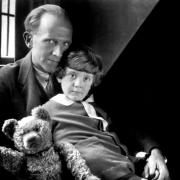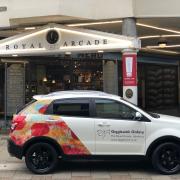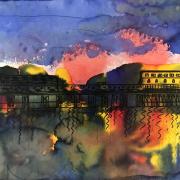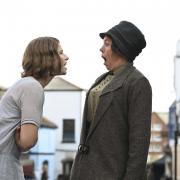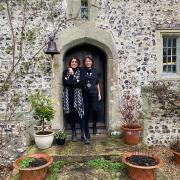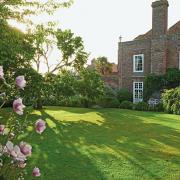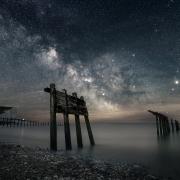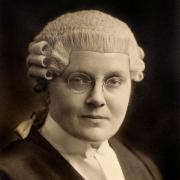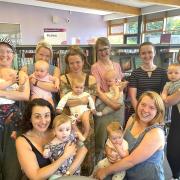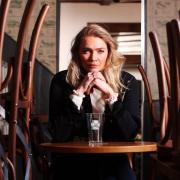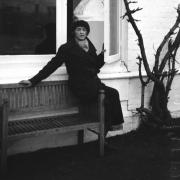Herbie Flowers has played bass with some of the greatest rock stars who have ever lived but he has always managed to keep his feet firmly on the ground. Veronica Groocock went to meet him at his happy house in Ditchling
Herbie Flowers, bass player extraordinaire, is the perfect host. He meets me at Lewes rail station at midday and drives me back to a small 17th Century cottage in Ditchling High Street, his home for the past quarter of a century.
“Are you hungry?” he asks me. He generally has “a little bit of rice with smoked salmon. It will take me 10 minutes. It’s no trouble”. And this most talented and prolific of musicians keeps one eye on the basmati rice while chatting away to me about his long association with Sussex and his innumerable work projects in the music business.
Now 73, he is busier than ever, with regular gigs in Brighton and Shoreham, his Rock Shops for young people and a forthcoming tour, in November, of Jeff Wayne’s War of the Worlds. “I haven’t got a spare minute,” he says.
His house has its own bothy out the back, a roomy rehearsal space for Herbie and his fellow musicians. It can also serve as an extra bedroom for his grandchildren.
For a man whose bass-playing skills have seen him in constant demand for recording sessions alongside musical legends such as David Bowie, Dusty Springfield, Lou Reed and T-Rex, he remains remarkably unfazed. Not one of these discs features in his own collection, which is “mostly Miles Davis and a bit of Mahler”.
Session musicians, he insists, are “workmen, in the same way that bus drivers and teachers are”. When he lectures to colleges (he taught at Ardingly College for five years), young musicians are intrigued to know how something – a particular musical riff or phrase – came about on one of his recordings, and Herbie is happy to demonstrate the technical side of it all.
As well as carving out a reputation as one of Britain’s top session players, he co-founded his own bands: Blue Mink, who had a huge hit with Melting Pot in 1969; and, later, the highly acclaimed Sky, with classical guitarist John Williams.
His son, Nick, who lives down the road, is a drummer and sound engineer. “He has his own music career. I’m not a pop star and have no aspirations to do that.” They see each other most days, and Nick helps his dad run the week-long Rock Shops, a key part of Herbie’s life for the past 30 years. There are about a dozen of them every year, attended by young people from schools all over Sussex, culminating in a concert called The Big Night Out at Brighton’s Dome.
Besides being an opportunity to experiment with their own material, students learn about how to survive in the music world, or simply how to treat music as a fulfilling hobby.
Herbie also organises one-day rock shops for younger children – “We did one not long ago, in Ditchling Primary School, and the kids were brilliant. It’s good for young musicians to be with professionals, sharing their experience.” Parents are invited to follow their child’s progress, “but when they turn up the kids say ‘Oh no, Mum and Dad – that’s not cool’!”
He has close links with the local community. Among his many ongoing ventures is a band called Music Box with a four-piece line-up. Their repertoire ranges from Gershwin’s Rhapsody in Blue through Bach and Shostakovich to a Mexican dance number. “We’ve done about 10 gigs and they’ve all gone down like a house on fire,” enthuses Herbie. Dame Vera Lynn, “one of Ditchling’s great luminaries”, attended the band’s first concert in June 2010 and thoroughly enjoyed it. “We were very proud… Everybody adores her – as they should. I had the great honour, years ago, of being in the BBC Orchestra for her TV series.”
He also belongs to several choirs and does musical arrangements for them, either by hand or on the computer. “It’s a lot of fun, but time-consuming,” Herbie admits.
Music is his main passion, but not the only thing in his life. There’s a fish pond in the garden, and his second favourite thing is to go out there early in the morning with a cup of coffee “and tickle the fish”. From the original 20, there are now 200-plus. “I give them a bit of food. They’re waiting for me, all in a line! It disproves that thing of fish only having about an eight-second memory.”
The house itself has a “cute little history”. He bought it on a kind of whim. At the time he was living in a big house in Uxbridge, which he hated. “I was driving through Ditchling and got talking to a lady called Eva Norman in Dolly’s Pantry. She’s nearly a hundred now. She knew my mum and my Auntie Kath. And I said to her: ‘If you hear of a nice little cottage, here’s my phone number’. Sure enough, three months later she rang: “There’s a little house in the High Street. Buy it!” And he did. He just knew for sure that it was the one for him.
“I think it’s always been a happy house. Looking in the village records… the Williams family lived here about 70 years ago and they had four kids – in this tiny cottage! And it used to be a shop that sold grain and farm produce. The cellar was a bike repair place attached to next door, which was an antique shop.”
Professionally, he says, Ditchling is very convenient. If he has recording work for electric bass, he travels up to London by train. If it’s for double bass, then he has to drive, which means a 4.30 a.m. start. But he is quite choosy about the work he does – and, thanks to technology, the day has arrived when he can use his little bothy as a 24-track recording studio. “There’s a lovely grand piano, and someone can come round with their laptop and a microphone and record it all.”
Much as he loves Ditchling – “such a beautiful medieval village” – Herbie is sad to see it “throttled” by traffic, more than ever due to the growing use of satnavs. “It’s enough to cause a property blight.” And, as a self-styled Ditchling man, he admits to being wary of newcomers – “especially ones with off-road vehicles that park on the bloody pavement. The older I’ve got, the more inclined I am to have a go! – not nastily, I don’t want to offend anyone…”
Traffic, along with ‘reality’ programmes, is a bugbear of his but – on the plus side – “the quality of water out of my tap is fantastic! I don’t know whether we have our own spring here…”
He lives alone but there is, he tells me, a lady in his life – Claire, a cellist. Originally from Wales, she lives in Finland, and they first met 20 years ago at Dartington International Summer School.
“We’ve had to build our lives around our work. She lives in a little town almost on the Russian border and works in a fantastic chamber orchestra . She has her own apartment and her own life there. But somehow we manage to be together for four or five months of the year… It’s all quality time, and it works well.” There’s the added convenience of being able to see each other via Skype: “We can have breakfast together, and we’ll spend two hours on a Saturday or Sunday morning doing the crossword together.”
His daughter lives in New York, and in June his niece and a friend are coming over from Canada. It will be their first time in England. They want to catch some of the Queen’s Jubilee celebrations, and they plan to take part in the London to Brighton bike ride. And he can’t wait to take them to see the famous two-humped Bactrian camel, which used to live in a big field opposite Glyndebourne opera house, but has now moved – apparently – to a field in South Chailey. This camel is, declares Herbie, “the friendliest, most beautiful animal I’ve seen in my life.” The sheer majesty of this creature (“along with half a dozen pieces of music”) makes him cry.
We finish our lunch and it’s time to go. On our way back to Lewes he points out the famous V of trees on the Downs – “I have a strong memory of my dad taking my sister, brother and me there on VE Day. My dad had a big bottle of Watney’s Pale Ale. We just sat there, with Dad singing There’ll Always Be An England…”
As a kid, he was unhappy at school in London, and remembers cycling down to Sussex on a Friday evening with his brother on “clapped-out old bikes”, to stay with their Uncle Ben and Auntie Kath at Leawood Farm in Chailey, where they would “kip in the long cottage, which was really a barn”.
All these years later, he is back in Sussex again and feels he belongs here.
“I’m where I wanted to be. Life couldn’t be sweeter.”
Herbie Flowers’ Jazz Breakfasts are at Brighton’s Corn Exchange (first Sunday in each month, 11 am, �6). His Lonely Hearts Piano Bar is at Ropetackle Arts Centre, Shoreham by Sea (last Friday in month, 8 pm, �8).



